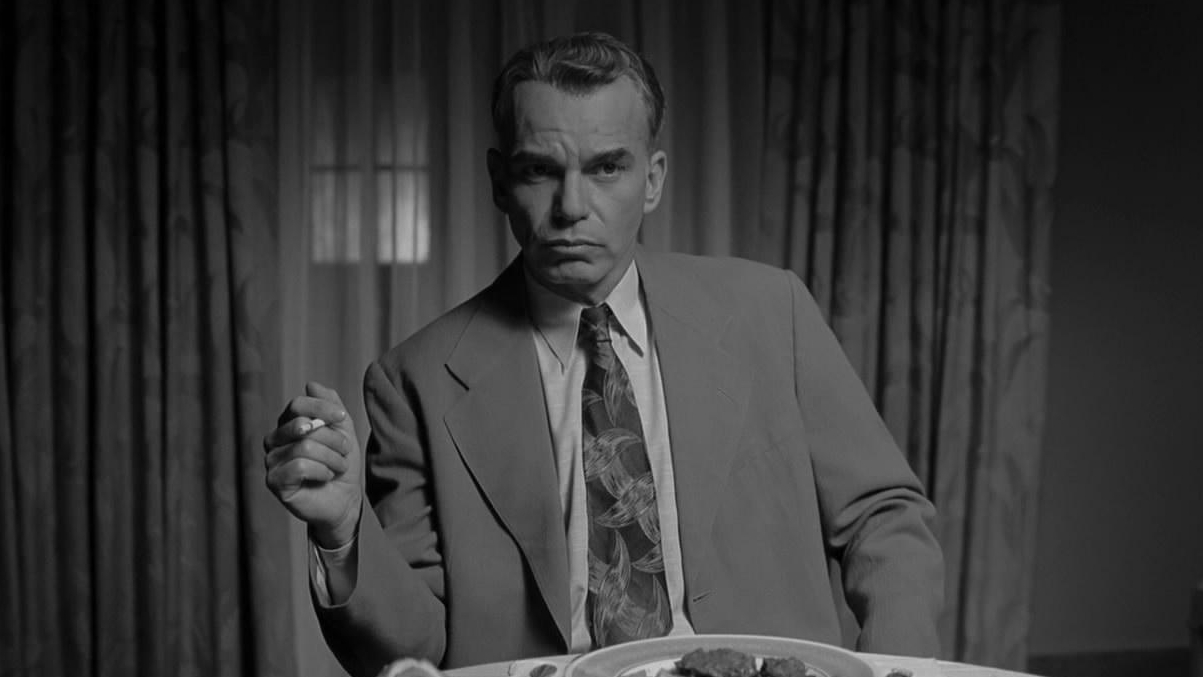Noirvember Files: The Man Who Wasn't There (2001)
“Yeah, I worked in the barber shop. But I never called myself ‘a barber.’”
Ed Crane (Billy Bob Thornton) delivers this opening line of The Man Who Wasn’t There in voiceover, and along with the rest of this opening monologue, provides all the subtext needed to understand how already-doomed he really is. In brief, he’s a man unsatisfied with how much he has, because he feels like none of it is really his; his wife Doris (Coen brothers mainstay Frances McDormand) has a bookkeeping job that Ed, at least, perceives as higher-class. His brother-in-law, Frank (Michael Badalucco), owns the barber shop, which is how he has a job.
He throws off mentions of all the modern features he owns outright in their mid-‘40s home—electric refrigerator, garbage disposal—it’s a California-style bungalow. But he’s clearly, deeply unsatisfied with all of it, because he knows Doris is sleeping with her boss, ‘Big’ Dave Brewster (James Gandolfini), who in reality is a rather small man.
Ed’s pettiness, his greed, and his gross ambition get the better of him. He blackmails Big Dave for seed money in a newfangled ‘dry cleaning’ enterprise, setting in motion a series of mishaps, murders, and misadventures that are as hilarious as they are over-the-top and nearly unbelievable. And they are unbelievable, we learn, simply because Ed Crane himself is telling the story and has quite the vested interest in telling it the way that he does.

Ed Crane is a man who himself can’t see how he affects his world. The smaller details show the cracks in his unreliable narration—people forget his name, and who he is, on meeting him a second time. In fact, aside from Frank, Doris and Big Dave, the only person who can remember Ed at all is someone he forgets about himself—Rachel “Birdy” Abundas (Scarlett Johansson), who he presents in his story as an ingenue with unrecognized talent at piano. That The Man Who Wasn’t There is scored almost entirely with piano melodies is no mistake—this beautiful young girl stays on his mind throughout.
The Man Who Wasn’t There is as much a self-damnation on Ed’s part as it is the truest noir film the Coens have ever produced. Not to say their other films aren’t noir-styled or noir outright--- but The Man Who Wasn’t There is the most directly-styled noir in terms of lighting, setting, period and the sheen of Golden Era sensibility that the black & white coloration lends to it. And this being a Coen brothers film, it still has a nasty streak of humor running right through the middle of it all—all the happier, contented people surrounding Ed are portrayed as idiotic, clueless, and without ambition (just as likely a result of the unreliable narration we get from Ed as from the Coen’s common themes of the common man being a dolt).

The presentation of all of Ed’s crimes (and there are many) are staged such that, without considering the reliability of the narrator, you’d be forgiven for thinking he just haplessly found himself next to all these dead bodies, and oh yeah, there’s a trunk full of money over there. In essence, if you believe Ed’s narration, the story is a tragedy of an ambitious everyman going for the American Dream and falling short. If you don’t, or if you scratch the surface of his narrative, you find a pitch-black comedy about an everyman who could never be satisfied with having comfort handed to him on a platter. The brilliance of the noir style and nihilistic themes is that you can watch the movie either way and find plenty to chew on with how much Ed Crane gives you.
But what would Ed know—he just cuts the hair.
The key to Dan Kwan and Daniel Scheinert’s two magnum opuses.
"Nothing comforts anxiety like a little nostalgia"
How the series ties everything from Bound to The Matrix Resurrections together.
The movies were back (mostly) in 2021 and Callie counts down her favorites, from Annette to Drive My Car!
How the novel by Tarantino lovingly opens up the world presented in the film.
Looking at some films that played at this year’s eclectic fest including Scenes from an Empty Church, Alien On Stage, and We’re All Going to the World’s Fair.
On how the new Netflix special is an effective look at an artist living through the pandemic.
On Martin Scorsese’s female characters and Vera Farmiga’s performance in his 2006 film.
A long, critical look at the greatness of the Saw franchise’s endings.
A personal essay on going back to the movies, and more.
On what the audience expects and what filmmakers deliver in two very distinct, yet similar, films.
The pseudo-major release of Tenet poses a myriad of complex questions about movie going in difficult times.
In her debut for our site, Sarah Fisher explores Jimmy Stewart’s career as he grew from “charming everyman” to Hitchcock’s vision of the “world-weary cynic”.
For his debut on the site, Loafpile dives deep into E.T. the Extra-Terrestrial and the current state of nostalgia-induced sequels.
Aaron looks at the powerful themes in The Last of Us - Part II in this deeply personal piece.
A first-hand experience of CFF’s all-virtual film fest.
The basketball drama from this past year sure did leave its mark.
Two decades later, Mary Harron’s adaptation remains a cutting dig at male masculinity.
A personal deep dive into why the character know as Kylo Ren is an important one.
Dave highlights the best of 2019 that weren’t in the Awards conversation.
From festival favorites to genuine surprises, Rachael highlights her favorite films of 2019.
Callie’s favorite films of the year illustrate just how bold and diverse a year for film 2019 was.
Ten spots weren’t enough for a year featuring films by Martin Scorsese, the Safdies, and Bong Joon-ho.

































